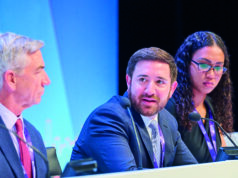
Medtronic has announced the first results from the global SYMPLICITY registry, which affirmed the safety of the renal denervation procedure with the Symplicity renal denervation system in a real-world patient population. Among the 617 registry patients with follow-up information available for this first analysis, no major complications or serious adverse events related to delivery of radio frequency energy to the renal artery were reported. Of these patients, two experienced access site vascular complications immediately post procedure. There was a 9% incidence of renal vessel irregularity on angiography due to the application of radiofrequency energy to the vessel wall following the procedure; none interfered with brisk renal blood flow and all are believed to have resolved shortly after the procedure.
While the primary endpoint of the global SYMPLICITY registry is to verify procedure safety with the Symplicity system, available data for the secondary efficacy analysis at six months showed renal denervation also has a significant reduction in both office and ambulatory blood pressure compared to baseline. Patients with systolic blood pressure of ³180mmHg and diastolic blood pressure of ³100mmHg had an average office blood pressure reduction of -30/-16mmHg (n=17) [systolic blood pressure p<0.0002; diastolic blood pressure p<0.0008] from baseline at six months. Patients with a systolic blood pressure ³160mmHg (or ³150 mm Hg in patients with diabetes) (n=114) had an average office blood pressure reduction of -18/-9mmHg) [p<.0001]; average blood pressure reduction for these patients who also had ambulatory blood pressure measurement (n=29) was -11/-4mmHg [p<.0001] from baseline. These data is expected to be presented at EuroPCR 2013 in Paris, France (21–24 May).
“These data speak strongly to the safety and efficacy of the renal denervation procedure with the Symplicity system; it is encouraging to see these positive results in a real-world setting,” said Felix Mahfoud, interventional cardiologist at the University Hospital Homburg/Saar, Germany. “The significant reductions in blood pressure seen in these patients could substantially reduce cardiovascular risk, as we know that in middle age even a 2mmHg decrease in systolic blood pressure can lead to a decrease risk of death from stroke by 10% and lower risk of death from ischaemic heart disease or other vascular cause by 7%.”
According to the company, the global SYMPLICITY registry is a multicentre, prospective, observational registry that will collect comprehensive data evaluating renal denervation and long-term cardiovascular outcomes from hypertension such as stroke, myocardial infarction, heart failure and cardiovascular death. It is the largest patient cohort in renal denervation to date, and the first of its kind to evaluate the real-world use of renal denervation in a large and diverse patient population in an uncontrolled setting. The registry will enrol more than 5,000 patients in a minimum of 200 centres with planned follow-up to five years. The registry also will gather data for other diseases characterised by elevated sympathetic drive, such as diabetes mellitus type 2, heart failure and chronic kidney disease.
Nina Goodheart, vice president, general manager, Renal Denervation, Medtronic. “We are encouraged by this first look at results from the global SYMPLICITY registry, which help confirm the safety of renal denervation with the Symplicity system, and allow us to monitor patient outcomes in a broader, more diverse population than in a clinical trial setting.”
The Symplicity renal denervation system is only available for investigational use in the USA.













